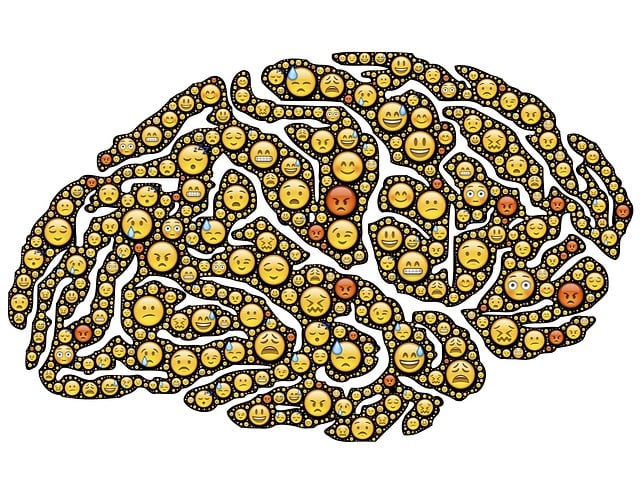Mood regulation is essential for optimal work performance in today's fast-paced environments, especially for healthcare providers facing high job stress. Implementing strategies like self-care routines, community programs, and emotional well-being promotion mitigates stress, fosters resilience, and enhances organizational culture. Cognitive strategies challenge negative thoughts, build resilience, and improve mindset balance; behavioral interventions encourage breaks, active engagement, and mental health education to reduce stigma. Creating a supportive work environment through open communication and practical emotional skills training benefits employees and organizations alike, boosting satisfaction and productivity while mitigating stress impacts.
In today’s fast-paced work environment, effective mood regulation strategies are essential for navigating superior workplace issues and job stress therapy. This comprehensive guide delves into various aspects of emotional well-being in the workplace. We explore how understanding mood regulation can significantly impact work performance, identifying triggers that contribute to workplace stressors, and providing cognitive and behavioral interventions for a more balanced approach. Additionally, we discuss organizational solutions to create a supportive environment, fostering employee wellbeing and productivity.
- Understanding Mood Regulation: Unraveling the Impact on Work Performance
- Identifying Triggers: Recognizing Workplace Stressors and Their Effects
- Cognitive Strategies: Reprogramming Your Mind for Emotional Balance
- Behavioral Interventions: Practical Steps to Enhance Mood at Work
- Creating a Supportive Environment: Organization-Level Solutions for Employee Wellbeing
Understanding Mood Regulation: Unraveling the Impact on Work Performance

Mood regulation is a vital aspect of maintaining optimal work performance and addressing superior workplace issues and job stress therapy. Understanding how to manage one’s emotional state can significantly enhance overall productivity and job satisfaction. When individuals effectively regulate their moods, they become better equipped to navigate challenging tasks, foster positive interactions with colleagues, and make sound decisions under pressure. This is particularly crucial in today’s fast-paced work environments where high-stress levels are often the norm.
By implementing effective mood regulation strategies, such as developing a robust self-care routine for better mental health, employees can mitigate the adverse effects of job-related stress. Community outreach program implementation and emotional well-being promotion techniques play a pivotal role in this process. These initiatives not only support individuals’ emotional resilience but also create a supportive organizational culture that prioritizes mental health, ultimately leading to increased productivity, creativity, and overall job satisfaction.
Identifying Triggers: Recognizing Workplace Stressors and Their Effects

In today’s fast-paced work environments, understanding and identifying triggers for stress and mood disturbances is a crucial step in maintaining emotional well-being. Workplace issues, often overlooked as significant stressors, can have profound effects on an individual’s mental health. From heavy workloads to demanding deadlines, these superior workplace issues may contribute to job stress that, if left unaddressed, can lead to burnout. Healthcare providers, in particular, are at risk due to the high-pressure nature of their work.
Recognizing these triggers is the first step towards implementing effective emotional regulation strategies. For instance, identifying specific tasks or situations that consistently cause anxiety or exhaustion can help professionals develop tailored burnout prevention strategies. Incorporating practices such as time management techniques, setting boundaries, and prioritizing self-care into daily routines can mitigate job stress. By focusing on emotional regulation, healthcare providers can enhance their resilience and maintain a positive work-life balance, ensuring they are equipped to provide optimal patient care.
Cognitive Strategies: Reprogramming Your Mind for Emotional Balance

Cognitive strategies offer a powerful tool for reprogramming your mind to achieve emotional balance, which is especially beneficial in navigating superior workplace issues and job stress therapy. By challenging negative thought patterns and replacing them with more positive and realistic ones, individuals can gain a sense of control over their emotions. This process involves self-awareness, identifying cognitive distortions like all-or-nothing thinking or catastrophizing, and then consciously reframing these thoughts to foster emotional regulation. For instance, instead of viewing a missed deadline as a total failure, one could reframe it as a learning opportunity that highlights the need for better time management strategies.
Integrating resilience building techniques into this cognitive approach further strengthens emotional stability. By adopting confidence-boosting practices like setting achievable goals and practicing self-compassion, individuals can enhance their ability to cope with stress and maintain a balanced mindset. These strategies not only improve overall well-being but also equip individuals with the mental agility to navigate professional challenges more effectively, ultimately leading to better job satisfaction and performance.
Behavioral Interventions: Practical Steps to Enhance Mood at Work

In the realm of superior workplace issues and job stress therapy, behavioral interventions play a pivotal role in enhancing employee mood and overall well-being. One effective strategy is to encourage regular breaks throughout the workday. Even short intervals can help reduce tension and prevent mental fatigue, allowing individuals to recharge and maintain focus. Additionally, promoting active engagement through standing desks or simple exercises during breaks can significantly boost energy levels and improve mood.
Integrating coping skills development into the workplace is another powerful approach. Implementing Mental Health Education Programs Design tailored for the office environment equips employees with practical tools to manage stress effectively. Public Awareness Campaigns Development focused on normalizing conversations around mental health further fosters a supportive atmosphere, encouraging open dialogue and reducing stigma. These interventions not only contribute to individual well-being but also create a healthier, more productive work environment overall.
Creating a Supportive Environment: Organization-Level Solutions for Employee Wellbeing

Creating a supportive environment is an essential aspect of addressing superior workplace issues and job stress therapy. Organizations play a pivotal role in fostering employee wellbeing by implementing various strategies at the organizational level. One effective approach is to promote open communication among team members and with upper management. Encouraging honest conversations about emotional experiences, challenges, and successes creates a safe space for employees to express themselves freely, which is crucial for emotional regulation.
Additionally, organizations can invest in training programs that teach practical emotional regulation skills and emotional well-being promotion techniques. These programs can equip employees with tools to manage stress effectively, enhance their resilience, and improve overall job satisfaction. By prioritizing employee wellbeing, organizations contribute not only to individual success but also to a healthier, more productive work environment, ultimately mitigating the adverse effects of workplace issues and job stress.
Mood regulation is a powerful tool for enhancing work performance and addressing superior workplace issues. By understanding the impact of mood on productivity, identifying stressors, employing cognitive strategies, adopting behavioral interventions, and fostering a supportive work environment, individuals and organizations can effectively manage job stress therapy. Implementing these strategies promotes emotional balance, boosts morale, and contributes to a healthier, more productive workforce.














